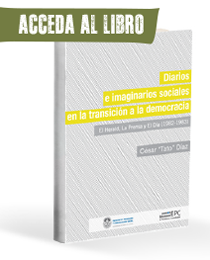The Emergency of Peronism in La Rioja
The Ways of Social Justice in the Written Press
DOI:
https://doi.org/10.24215/24690457e050Keywords:
peronismo, La Rioja, intervention, social rights, ArgentinaAbstract
In Argentina, the emergence of peronism acquired particular characteristics in settings far from the large urban centers of the country. In this paper, the case of the province of La Rioja is addressed, where the peronist governments were established as «problem solvers». From this logic, the expressions in the La Rioja written press on social justice are analyzed, as well as the role played by the Ministry of Labor and Welfare. It is concluded that La Rioja peronism meant social justice as a way of solving problems through state presence in areas where it had no impact before.
Downloads
References
Aboy Carlés, G. (2007). La democratización beligerante del populismo. Debate. Revista de la Asamblea Nacional de Panamá, 47-58. https://filadd.com/doc/aboycarles-la-democratizacion-beligerante-del
Aelo, O. (2015). El origen del peronismo: una aproximación interprovincial. Trabajos y Comunicaciones, 41.
https://www.trabajosycomunicaciones.fahce.unlp.edu.ar/article/view/TyC2015n41a04
Álbarez Gómez, N. (2012). El origen del peronismo en La Rioja. Rastreando en la emergencia del discurso peronista el origen de la línea de continuidad que atraviesa las distintas identidades peronistas desde su nacimiento. Actas de III Congreso de Estudios sobre el peronismo, Universidad Nacional de Jujuy. http://redesperonismo.org/articulo/el-origen-del-peronismo-en-la-rioja-rastreando-en-laemergencia-del-discurso-peronista-el-origen-de-la-linea-de-continuidad-que-atraviesa-lasdistintas-identidades-peronistas-desde-su-nacimiento/
Álbarez Gómez N. (2013). La hegemonía del peronismo en La Rioja, desde el advenimiento de la democracia hasta el 2000 (Tesis Doctoral). Universidad Nacional de Córdoba, Argentina.
Álbarez Gómez, N. y Torres, R. (2019). La emergencia del peronismo riojano y la construcción de su articulación hegemónica entre 1945 y 1948. UNLaR Ciencia, 47, 4-18.
Barros, S. (2011). La crisis de la deferencia y el estudio de las identidades políticas en los orígenes del peronismo. Papeles de Trabajo, 5(8), 13-34. https://revistasacademicas.unsam.edu.ar/index.php/papdetrab/article/view/226
Barros, S. (2012). La presencia obnubilante del populismo. Utopía y praxis latinoamericana, 17(5), 39-51. https://produccioncientificaluz.org/index.php/utopia/article/view/2899
Bravo Tedín, M. (1995). Cuando La Rioja se hizo peronista. Canguro.
Garzón Rogé, M. (2019). De enigma a paradoja. Reensamblar la política de los primeros peronistas (1945-1955). Boletín del Instituto de Historia Argentina y Americana Dr. Emilio Ravignani, 169-203. http://revistascientificas.filo.uba.ar/index.php/boletin/article/view/6584
Glynos, J. y Howarth, D. (2007). Logics of Critical Explanation in Social and Political Theory. Routledge.
Groppo, A. (2009). Los dos príncipes: Juan D. Perón y Getulio Vargas. Un estudio comparado del populismo latinoamericano. Editorial Universitaria de Villa María (Eduvim).
Howarth, D. (2005). Aplicando la teoría del discurso: el método de la articulación. Studia Politicae, 5, 37-88. Universidad Católica de Córdoba
James, D. (2006). Resistencia e integración. El peronismo y la clase trabajadora. Siglo XXI.
Laclau, E. y Mouffe, Ch. (1987). Hegemonía y estrategia socialista. Hacia una radicalización de la democracia. Siglo XXI.
Laclau, E. (2000). Nuevas reflexiones sobre la revolución de nuestro tiempo. Nueva Visión.
Laclau, E. (2005). La razón populista. Fondo de Cultura Económica.
Macor, D. y Tcach, C. (2003). El enigma peronista. En D. Macor D. y C. Tcach (Eds.), La invención del peronismo en el interior del país (pp. 5-31). Universidad Nacional del Litoral.
Quevedo, H. (1991). El partido peronista riojano (Crónica y personajes para la historia). Tomo I. Leme.
Tasso, A. (2011). La sequía de 1937 en Santiago del Estero. Antecedentes y consecuencias de un acontecimiento ambiental. Trabajo y Sociedad, 17(XV), 17-39. https://www.redalyc.org/articulo.oa?id=387334689002
Torre, J. C. y Pastoriza, E. (2004). La democratización del bienestar. En J. C. Torre (Dir.), Nueva Historia Argentina VIII (pp. 257-313). Sudamericana.
Vargas, M. y Vezzosi, J. (2018). Tradición, política y disputa por el sentido: analizando los orígenes del Peronismo desde la posición de la prensa de Santiago del Estero (1945-1946). Izquierdas, 42, 159-185. http://dx.doi.org/10.4067/S0718-50492018000500159
Additional Files
Published
How to Cite
Issue
Section
License
Copyright (c) 2022 Natalia Álbarez Gómez, Marilina Truccone

This work is licensed under a Creative Commons Attribution-NonCommercial-ShareAlike 4.0 International License.
The acceptance of an original by the journal implies the non-exclusive transfer of the patrimonial rights of the authors in favor of the publisher, who allows the reuse, after its edition (postprint), under a Creative Commons License Attribution-NonCommercial-ShareAlike 4.0 International.
According to these terms, the material can be shared (copy and redistribute in any medium or format) and adapted (remix, transform and create another work from the material), provided that a) the authorship and the original source of their publication (magazine and URL of the work) are cited, b) is not used for commercial purposes and c) the same terms of the license are maintained.
The assignment of non-exclusive rights implies that after postprint in IMPRONTAS de la historia y la comunicación authors may publish their work in any language, media and format; in that case, it is requested that they signal that the material was originally published by this journal.
Assignment also entails the authors’ authorization for the work to be collected by SEDICI, the institutional repository of the Universidad Nacional de La Plata, and for it to be indexed in the databases that the publisher thinks appropriate for enhancing the visibility of the published work and its authors.
In addition, the journal encourages authors to submit their works to other institutional and thematic repositories after their publication in IMPRONTAS de la historia y la comunicación, under the assumption that offering society unrestricted access to scientific and academic production contributes to a greater exchange in global knowledge.






.jpg)


.png)


.png)


















